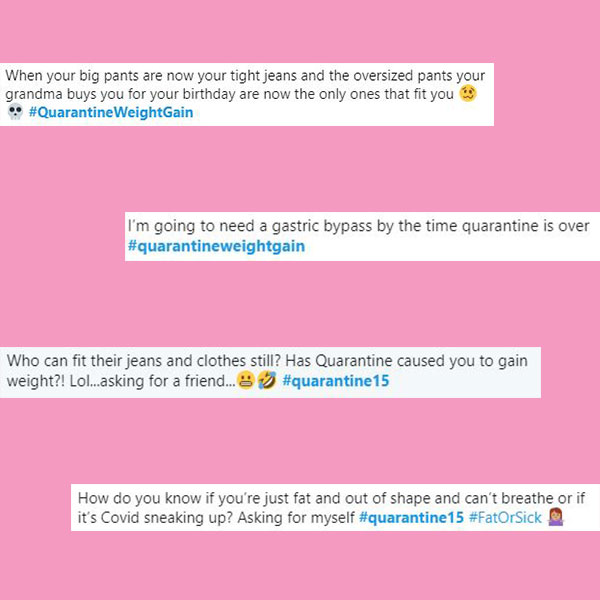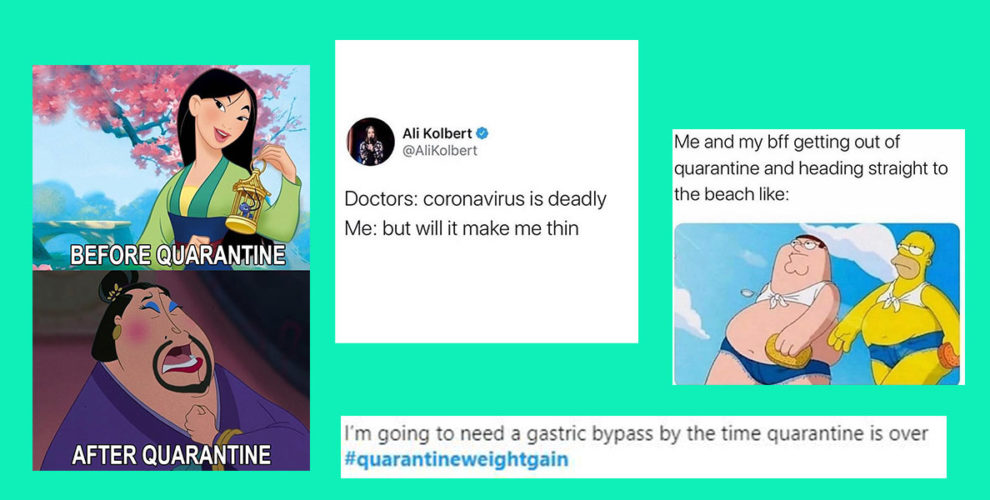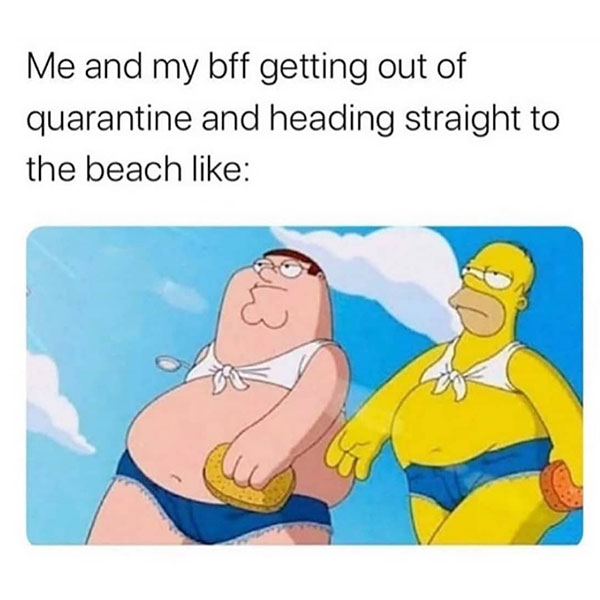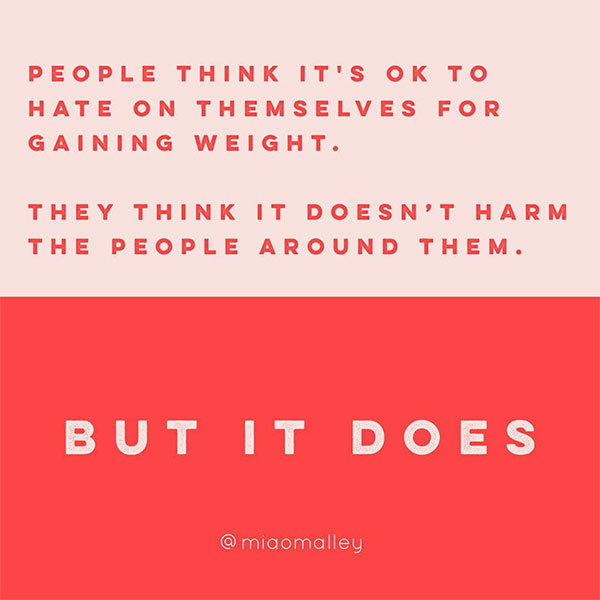Quarantine Weight Gain
It’s not just Circuit Bakers who have emerged from the Circuit Breaker. The temporary closure of fitness facilities has also given birth to a legion of stay-home #fitspo aspirants. Exercise enthusiasts are sweating it out to YouTube workouts by the likes of Chloe Ting and Pamela Reif, all in the name of healthy living. Or, more accurately, to avoid the dreaded quarantine weight gain.
Insecurities disguised as memes and complaints

A compilation of quarantine weight gain jokes from Twitter
Since the start of the stay-home measures across the world due to COVID-19, there has been a rise in social media engagement on posts related to burgeoning waistlines. A glance at your Twitter timeline shows a quarantine weight gain meme. A peek at Instagram Stories reveals that your friends are sulking about getting fatter while surrounded by snacks at home.
Innocent as they might seem, quarantine weight gain jokes are no laughing matter. The original poster disguises their insecurities as a meme. More people relate to their post and reshare it. This creates a vicious cycle of posting and reposting that gets increasingly toxic.
Similarly, comments like those about how someone won’t be able to fit into their old clothes after quarantine or how they are “fattening the curve” reflect the poster’s own anxieties under the thinly veiled guise of humour.
Also read:
7 Singaporean Millennials Talk About Having Eating Disorders And How They Recovered
The harmful impact of our aversion to weight gain
We’re in the midst of a pandemic that has claimed hundreds of thousands of lives. It hurts that rather than uniting as one to help vulnerable social groups, we are more focused on spreading negativity.
There are hundreds of other actions we could take to make a positive impact on our community. You could be fighting racism in Singapore, donating to migrant workers, funding sanitising kits for the less fortunate, or volunteering to provide free online tuition for underprivileged students.
Instead, we choose to repost memes that erode years of progress towards greater body positivity and a more wholesome idea of what it means to be healthy.
Discrimination against larger bodies has a tangible impact on mental health. Memes about gaining weight can send a signal to someone that their body is neither valid nor worthy. That bodies like theirs are a fate that shouldn’t be wished upon anyone. It also suggests that we think those with larger bodies lack self-control and discipline.
Mia O’Malley, a plus-sized activist, summed it up succinctly in a poignant Instagram post. “In times of uncertainty, people cling to their traditions. Hating on our own bodies for getting larger and hating on others’ bodies is a long-standing tradition.
“Please know this: you virtually hating on your body for changing during quarantine, sharing quarantine weight gain memes is your [internalised] fatphobia. And just because it’s turned in on yourself does not mean it’s harmless. You are spreading shame. Stop sharing the memes. Let’s break from this very tired tradition of hating on ourselves for what we eat, [criticising] our bodies and [subtly] policing ourselves and others.”
A potential trigger for those with eating disorders
People without a neutral relationship with food are uniquely vulnerable to the sudden decline in body positivity. To you, it’s nothing but a harmless jest about not being able to fit into your jeans. But to someone who is desperately trying to maintain a healthy diet in spite of their eating disorder, the thoughtless joke could be a potential trigger for unleashing deep-seated fears surrounding weight and body image.
According to an article by KK Women’s and Children’s Hospital, “A Singapore-based study revealed that 7.4 per cent of females (aged 12 to 26) are at risk for developing an eating disorder.” This same age group is also extremely active on social media.
If you have a history of eating disorders, the isolation, loss of a daily routine and unpredictability that come along with quarantine serve as an added obstacle on the road to recovery.
For both groups, being bombarded by quarantine weight gain memes and jokes acts to further fan the flames.
Spread Body Positivity, Not Shame, By Putting An End To Quarantine Weight Gain Jokes
It is perfectly valid to feel angry, stressed, tired, or all of the above in these trying times. But the next time you feel the urge to reshare a quarantine weight gain post or talk about how much weight you’ve gained while WFH, think about the people you love who may feel hurt by your sharing. While mocking your own body, what are you saying about theirs?
Just as every body is a beach body, every quarantine body is a valid body. Stay healthy, keep safe, and don’t let anything stop you from feeling yourself and being the sexy beast that you are. Go get ’em, tiger!
Cover: Source, source, source, source
Also read:
Toxic Positivity May Be The Worst Form Of Negativity Because We’re Not Even Aware Of It











